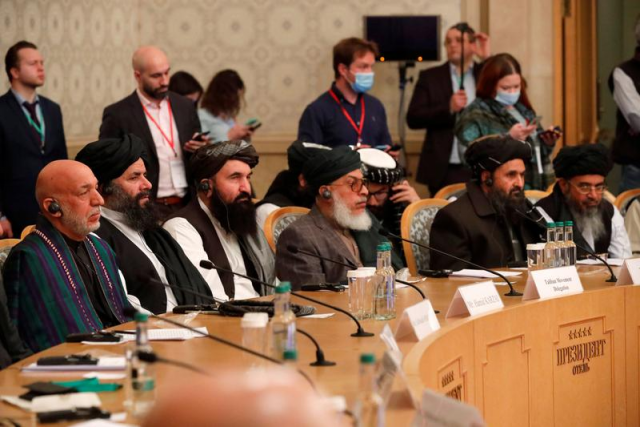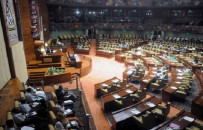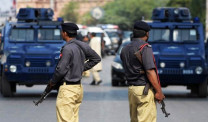Taliban urged not to launch ‘spring offensive’
Pakistan joins US, Russia and China in call for Afghan ceasefire

The United States, Pakistan, Russia and China on Thursday urged the Afghan Taliban to refrain from launching “spring offensive” to avoid more bloodshed in the strife-torn country, as envoys huddled together with the Afghan government and the Taliban representatives in Moscow on Thursday.
Moscow hosted what was called “extended troika” as part of Russia’s push to break stalemate in the intra-Afghan dialogue.
The meeting in Moscow that brought together delegates from Pakistan, China, the US , Qatar and Turkey along with Afghan government and the Taliban representatives is the first of the three international conferences planned ahead of the May 1 deadline set for the foreign troop withdrawal from Afghanistan.
“We hope that today’s talks will help achieve progress in the inter-Afghan talks,” Russian Foreign Minister Sergey Lavrov said at the start of the meeting.
The huddle in Moscow was attended by US Special Envoy Zalmay Khalilzad, head of the Afghan high peace council Dr Abdullah Abdullah, chief Taliban negotiator Mullah Abdul Ghani Baradar, Pakistan’s special envoy for Afghanistan Ambassador Muhammad Sadiq and others.
A joint statement issued after the meeting urged the Taliban to not launch “spring offensive” and also called on both sides to negotiate and conclude their peace agreement.
Ambassador Sadiq said Pakistan, China and the US were members of the extended “troika” while Qatar and Turkey attended the meeting as special guests. In addition, 10 members each from Kabul and the Taliban were at the meeting.
He thanked Russia for hosting the meeting at this ‘critical juncture’ while stressing that without peace, the dream of connectivity, economic development and prosperity of the region would never materialise.
“Pakistan believes in exclusive approach towards negotiations and governance will significantly help the cause of sustainable peace in Afghanistan. The international community needs to remain engaged in Afghanistan and help the country at this critical juncture,” he told the participants.
He said Pakistan’s message, as a neighbour and the most-affected country of the 40 years of conflict, was “loud and clear”: “we support stability in Afghanistan and we want to see a prosperous Afghanistan”.
Head of the Afghan peace council called for the reduction in violence while addressing the conference. “We called for an end to violence and the acceleration of the peace talks,” he said.
Abdullah asked the regional countries and beyond to help Afghanistan in its drive to achieve a lasting peace.
He further said the negotiating team of the Afghan government was ready to discuss any issue or topic with the Taliban. “We called for an end to targeted killings and a comprehensive ceasefire to being the next round of talks in a peaceful manner.”
Another such meeting is expected next month in Turkey as part of the renewed push by the Biden administration to seek a political solution to the war.
"At this turning point, our four countries call on the sides to hold talks and reach a peace agreement that will end more than four decades of war in Afghanistan," a joint statement said after Thursday's talks.
The statement said the four countries were committed to mobilising political and economic support for Afghanistan once a peace settlement had been reached.
President Joe Biden must soon decide whether to keep forces on past a May 1 deadline to withdraw, agreed with the Taliban last year under Biden's predecessor Donald Trump.
Moscow, which fought in Afghanistan in the 1980s, has hosted talks among Afghan sides and regional powers since 2017.
Previously, Washington had largely kept its distance from the so-called "Moscow Format", focusing on its own direct talks with the Taliban and talks between the Afghan parties themselves.
Afghan President Ashraf Ghani opposes an interim government, and a Taliban leader has said the group would not join it, although it supports replacing the current administration.
With additional input from Reuters



















COMMENTS
Comments are moderated and generally will be posted if they are on-topic and not abusive.
For more information, please see our Comments FAQ